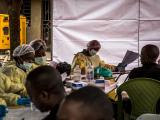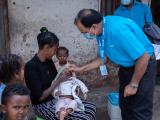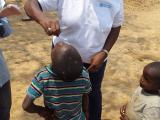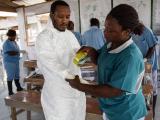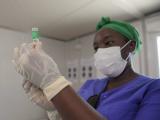Oct 21, 2011
Only a few bird, mosquito species may be key in US West Nile spread
West Nile virus (WNV) spread throughout the United States after its introduction into the country in 1999, but a review article in today's issue of Science found that in most areas only a few species of bird hosts and mosquito vectors are crucial for disease transmission. What's more, the review, by University of California, Santa Cruz biologist Marm Kilpatrick, PhD, said American robins play such a key role in WNV spread that he calls them "super-spreaders," according to a press release from the National Science Foundation (NSF). "We now know that in any given location, only one or two species of mosquitoes play a big role, and only a handful of birds appear to be important in overall transmission rates," he said, adding, "Robins are more important in transmission than their abundance alone would suggest." Kilpatrick reviewed more than a decade's worth of data and concluded that (1) WNV transmission is highest
in urbanized and agricultural habitats, (2) the introduced virus quickly adapted to infect local mosquito vectors more efficiently, and (3) highly focused feeding patterns of the mosquito vectors resulted in unexpected host species being important for transmission. In addition, "The mosquitoes that bite humans most are actually not as important in transmission of West Nile virus to humans because they rarely bite birds and thus rarely get infected in the first place," he said in the release.
Oct 21 Science abstract
Oct 20 NSF press release
Report says institutional culture shift needed in effort to wipe out polio
Efforts to wipe out polio are hampered more by management of the global eradication program than by challenges posed by the poliovirus itself, a candid report from an independent panel said yesterday. The report lists five systemic problems in the Global Polio Eradication Initiative (GPEI)including letting ineffective local managers keep their jobs and maintaining an overly rosy focus. In discussing these, the GPEI's Independent Monitoring Board (IMB) wrote in the report, "Tackling each will require challenging introspection for the Programme, but will produce great gains. The style and approach to management of the global Programme needs reorientation." The IMB said that efforts to eradicate the disease by the end of 2012 as hoped will not succeed unless the group immediately addresses these problems. The three other issues highlighted were a lack of focus on improving quality and delivering on plans, an
unclear distinction between National Immunization Days and Sub-National Immunization Days, and few incentives for innovation. In addressing what it called the GPEI's overly optimistic outlook, the IMB said the organization emphasizes successes at the expense of addressing failures. It called this approach "a pervading sense of 'nearly there'" (near eradication). The report also gives a nation-by-nation summary, highlighting especially reintroduction of the virus into once polio-free countries and saying that the situations in Nigeria and especially Pakistan are of "major concern."
Oct 20 IMB report
New Ebola-like filovirus found in Spain
Spanish and US scientists have discovered a new Ebola-like filovirus in Spain, the first known detection of such a virus outside sub-Saharan Africa and the Philippines. Reporting in PLoS Pathogens yesterday, they describe identifying the virus in a specimen from a dead common bent-wing bat (Miniopterus schreibersii) during an investigation of bat die-offs in southern Europe. They named the novel pathogen Lloviu virus (LLOV) after the Cueva del Lloviu region in which the bat was found. They write, "LLOV is genetically distinct from other marburgviruses and ebolaviruses and is the first filovirus detected in Europe that was not imported from an endemic area in Africa." Filoviruses are among the most lethal of pathogens in primates, including humans.
Oct 20 PLoS Pathog report
